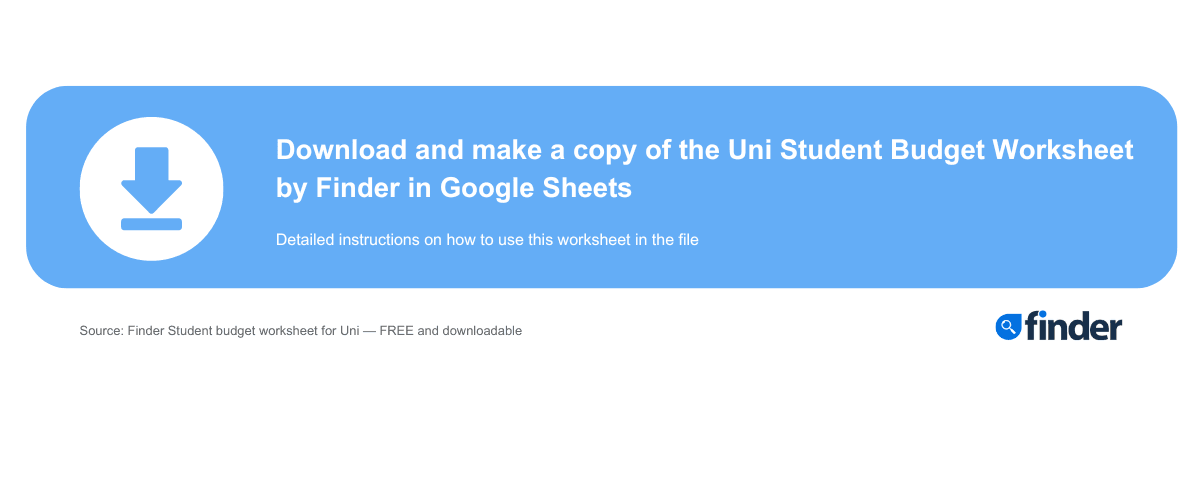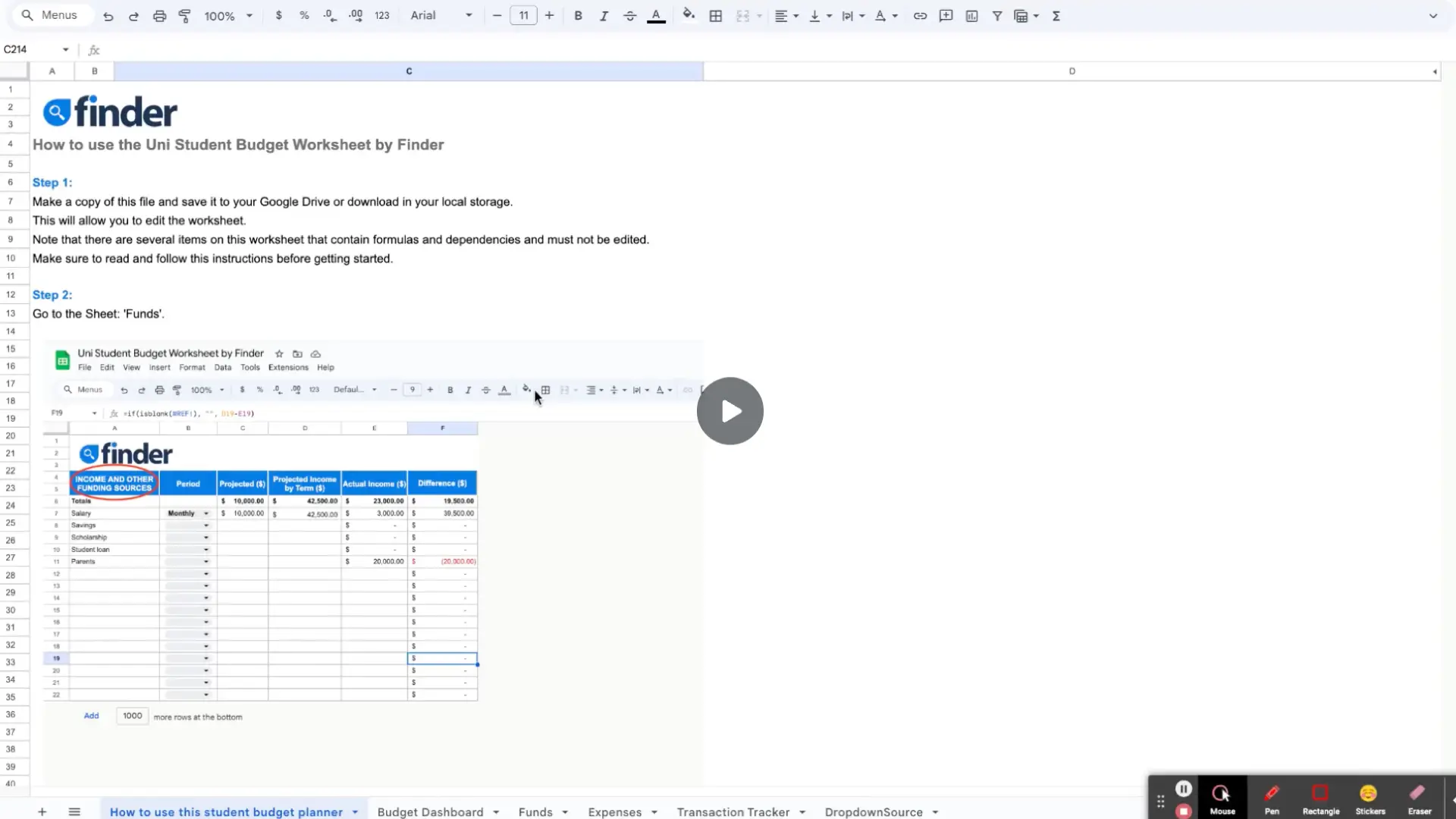Your financial ability in uni can make or break your academic journey from tuition fees to textbooks, groceries to transportation costs. Using a student budget template, budgeting for students becomes more manageable, giving you better control over your money.
In this article, we'll explore the importance of budgeting for students, introduce a free uni student budget template, and provide insights into managing student living expenses in Australia.
The importance of budgeting for students
Budgeting is a fundamental aspect of financial literacy and a prerequisite to surviving uni life. If you learn to control your money effectively, chances are you'll do better than survive and live comfortably as you earn your degree.
Budgeting is a life skill that exercises your discernment in allocating a finite resource — money – to meet your needs efficiently, and, yes, some of your wants as well. Mastering your finances today sets you up for success in uni and throughout your career. The earlier you practice, the better you can define your financial roadmap. It all starts by learning to navigate your income and expenses.
For students, budgeting instils discipline, promotes responsible spending habits, and cultivates financial independence. By creating and adhering to a budget, students can avoid unnecessary debt, build savings, and avoid financial stress.
The free student budget worksheet
This student budget template by Finder is designed to simplify the budgeting process for students. It provides a structured framework for organising income, expenses, and savings, enabling students to track financial activities effectively.
Whether you're a full-time student, part-time worker, or receiving financial aid, this budget template offers versatility and customisation to suit individual needs.
Before going through how you can use the student budget calculator and the downloadable budget spreadsheet template for uni students, let's first dive into the components of a typical student budget:
Income
- Begin by listing all sources of income, including wages from part-time jobs, scholarships, grants, and allowances, including from your parents.
- Check out more ideas on how to earn money in Australia as a student.
Expenses
- Categorise expenses into fixed and variable categories.
- Fixed expenses include costs that you cannot live without. This includes recurring costs for your needs like tuition fees, rent, utilities, and insurance premiums.
- If you need help paying your student contribution amount, check your eligibility for HECS-HELP.
- Variable expenses, on the other hand, include groceries, transportation, entertainment, and miscellaneous purchases. Some like food and transportation you still can't do without but can be more flexible with how much you spend.
- For example, rather than eating out, you'll find it might be cheaper to cook your food and share the market costs with your friends or roommate.
- Rather than driving your car, you might walk or bike to uni from your apartment and back instead. It saves you from soaring fuel prices and is good for your health too.
Savings
- Allocate a portion of your income towards savings or emergency funds. You'll never know when you might need extra cash for a term project, to get your faucet or car fixed, or to require medical attention.
- Cultivating a savings habit, no matter how small, is essential for financial resilience.
Budget Tracking
- Utilise the uni student budget template to record actual income and expenses, then compare them against projected funding and costs.
- Regularly reviewing your budget enables you to identify spending patterns, adjust allocations, and stay on track towards your financial goals.
How to use the free uni student budget worksheet
This online free budget spreadsheet for students in Australia features a user-friendly interface with categories you can customise to suit your financial needs.
Whether you're budgeting on a semestral, weekly or monthly basis, this uni student budget template provides the flexibility to adapt to your preferences.
Keep better track of your expenses and make swift adjustments to your budget if needed.
How to manage student living expenses in Australia
For foreign and local students studying in Australia, navigating the country's unique cost of living is a must to budget effectively.
Consider the following tips to save on your student budget:




Learn more ways to save money as a student in Australia. Also check out other budgeting tips for international students.
Use the student budget worksheet
Budgeting for students is an essential skill that lays the foundation for financial success and stability. This student budgeting worksheet can aid in controlling your finances, minimising debt, and working towards your financial goals.
Always know where your money goes. Remember to prioritise needs over wants, track your expenses diligently, and adjust your budget to accommodate unexpected deviations. Level up your financial literacy and take charge of your financial future today.
Get your student finances sorted. Mastering the art of budgeting as a student is a journey filled with challenges and rewards. By utilising tools such as the student budget template and adopting prudent financial habits, you can navigate the complexities of student living expenses in Australia with confidence and resilience.
Ask a question
More guides on Finder
-
Budget tips for international students
There's plenty of ways to save money as an international student in Australia.
-
Alternatives to MoneyBrilliant
MoneyBrilliant is closing on 16 December 2022. Here are popular alternatives for those looking to move to a new money management app.
-
Alternatives to the Pocketbook app
Pocketbook is closing its doors in August 2022. Here are the best alternative money and personal finance apps available in Australia.
-
Budget planner: win at money
Use our free budget planner template to create a personalised budget to track your expenses so you can spend less and save more.
-
How much money should I have in savings?
See how much money people your age have in savings, and learn how to boost your savings balance if it's below average.
-
How to budget for living expenses
Living expenses may be easily managed with these five tips.
-
Free household budget template
Household budget templates are useful financial tools to help you manage your money better.
-
How to prepare your finances for a recession
How to get your debts, savings, super and your investments sorted for an economic downturn.
-
What is my net worth?
Your net worth is calculated based on the value of your assets minus your liabilities, and this figure represents your overall financial health.
-
How to save and budget for a baby
Reduce the amount of emotional rollercoasters when you're pregnant by sorting through your finances.


